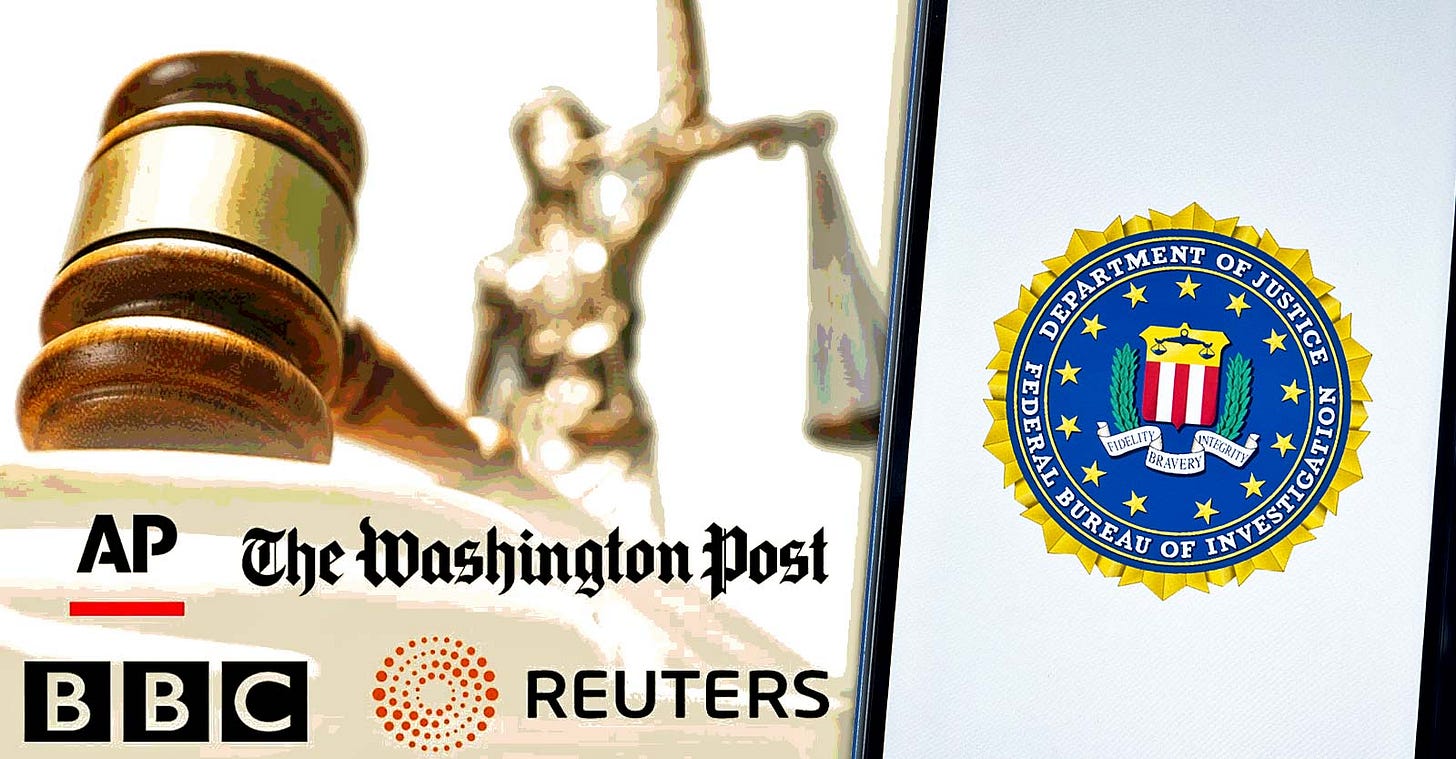DOJ Backs Children’s Health Defense in Antitrust Suit Against Big Media
In a show of support for independent media voices, the DOJ today filed a statement of interest backing Children's Health Defense and a group of independent journalists.
by Michael Nevradakis, Ph.D.Brenda Baletti, Ph.D.
In a show of support for independent media voices, the U.S. Department of Justice (DOJ) today filed a statement of interest backing Children’s Health Defense (CHD) and a group of independent journalists who sued several of the world’s largest news and Big Tech organizations.
In a 22-page statement filed with the U.S. District Court for the District of Columbia, the DOJ argued that the Trusted News Initiative (TNI) — a partnership formed by Reuters, The Washington Post, The Associated Press, BBC and others — engaged in anticompetitive practices when its members colluded with tech platforms to censor alternative viewpoints.
According to the DOJ statement:
“News consumers desire and demand diverse perspectives. Americans therefore vitally depend on viewpoint competition in the marketplace of ideas to limit the abuse of market power and ensure the free flow of information in our democracy. …
“… The United States therefore files this statement to urge the Court to reject Defendants’ suggestion that the antitrust laws play no part in protecting viewpoint competition in news markets. Instead, controlling precedent shows that the Sherman Act protects all forms of competition, including competition in information quality.”
In a press release, Abigail Slater, assistant attorney general with the DOJ’s Antitrust Division, said:
“When companies abuse their market power to block out and deplatform independent voices and protect legacy media, they harm competition and threaten the free flow of information on which consumers depend …
“This Antitrust Division will always defend the principle that the antitrust laws protect free markets, including the marketplace of ideas.”
Jed Rubenfeld, an attorney for CHD, said the DOJ’s statement confirms the “importance of this case and the gravity of the TNI’s concerted attack on dissenting online news publishers.”
“The TNI is a classic abuse of market power and its censorship of facts and opinions online, especially during the pandemic, was and is a grave threat to democracy,” Rubenfeld said.
The DOJ occasionally files statements of interest in cases before federal district courts when it wants to inform the court about a legal issue related to its competition mission, according to Renata Hesse, co-chair-elect of the American Bar Association’s Antitrust Law Section.
Lawsuit alleges defendants engaged in horizontal agreement, economic collusion
The lawsuit, filed in 2023, alleges that TNI violated the Sherman Antitrust Act by collectively colluding with tech giants to censor independent news outlets in a move designed specifically to cripple the smaller publishers’ ability to compete.
Plaintiffs include CHD; Creative Destruction Media; TrialSite News; Ty and Charlene Bollinger, founders of The Truth About Cancer and The Truth About Vaccines; Erin Elizabeth Finn, publisher of Health Nut News; Jim Hoft, founder of The Gateway Pundit; Jeff Crouere, host of “Ringside Politics”; chiropractor Ben Tapper; Dr. Joseph Mercola; and independent journalist Ben Swann.
The case had languished until earlier this month, when the DOJ filed a five-page notice signaling its intention to intervene. The DOJ had until July 18 to file its statement.
The DOJ’s statement of interest suggests that TNI’s actions harmed its competition, amounting to antitrust injuries that are protected under the Sherman Antitrust Act.
The DOJ also argued that the law prohibits concerted action that unreasonably restricts trade — including “viewpoint competition.”
The plaintiffs allege they were censored, banned, deplatformed, shadow-banned or otherwise penalized by the Big Tech firms that partnered with the TNI to censor views and content deemed “misinformation” or “disinformation.”
Core partners of TNI’s “coalition of the willing” include the AP, Agence France Press, the BBC, CBC/Radio-Canada, the European Broadcasting Union, the Financial Times, Google/YouTube, The Hindu, The Nation Media Group, Meta, Microsoft, Reuters, the Reuters Institute for the Study of Journalism and The Washington Post.
TNI’s actions resulted in loss of visibility, revenue for small, independent publishers
According to TNI’s website, its partners collaborate “to tackle harmful disinformation in real time.”
However, CHD alleged that TNI developed a “strategy to beat disinformation” in which the initiative’s members, who are competitors, would collaborate to counter “a tidal wave of unchecked [reporting] that’s being piped out mainly through digital platforms,” and which is “the real competition now in the digital media world.”
The lawsuit also alleges that TNI members “agreed in 2020” to target online news relating to COVID-19 and to ensure that “harmful disinformation myths are stopped in their tracks.”
The TNI’s legacy media and Big Tech firms then acted in concert — described in legal terms as a “group boycott” — to remove such voices and perspectives from their platforms.
CHD and its co-plaintiffs alleged this resulted in a significant loss of visibility and revenue for the plaintiffs.
Defendants previously sought to dismiss the lawsuit
Since the lawsuit was filed, it has moved from federal courts in Texas and Louisiana before making its way to the District of Columbia.
In August 2023, attorneys for the defendants unsuccessfully sought to dismiss the case. Later that month, Jeff Landry, then attorney general of Louisiana and now the state’s governor, filed an amicus brief in support of the plaintiffs.
An amicus brief is filed by non-parties to a lawsuit to provide information that has a bearing on the issues and to assist the court in reaching the correct decision.
The plaintiffs are requesting a jury trial and treble damages from reduced visibility and advertising revenue.
Related articles in The Defender






Treble damages makes legal sense if we were just talking about the economic harm to these individuals and businesses. Nevertheless, we are also talking about democide. One way to prevent future democides would be to award these plaintiffs 20% shares in each business that participated in the Trusted Media Initiative. Then freedom of information would be almost assured because of their collective voting power.